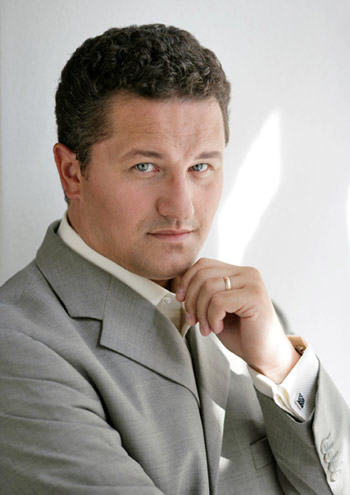After a slow start, Beczała displays fire and charm at Zankel Hall
Sometimes, the trajectory of a recital is beyond explanation.
Piotr Beczała, who likely could have sold out Carnegie’s main hall without too much trouble, on Friday night gave a recital in Zankel Hall that just about defined “one-sided.”
The front half of his program was Schumann’s song cycle Dichterliebe, and Beczała never sounded comfortable in the lieder idiom. “Im wunderschönen Monat Mai,” one of the most innocently lovely openings of any lieder cycle, simply was not nearly innocent or lovely enough.
Where the Polish tenor was able to sing with authority, as in “Im Rhein, im heiligen Strome,” or with a little swagger, as in “Ein Jüngling liebt ein Mädchen,” Beczała was able to find a little more color. But on the whole, and especially in the slower, more thoughtful songs, he struggled to find much depth of tone, and sounded breathy when he tried to sing softly. Moreover, he displayed little connection to the text, singing Heine’s poems as though memorized by rote.
To hear him take the stage after intermission, singing in his native language, was a welcome change. From the very beginning of “Zawód” (Disillusion), the first of a set of seven songs by Mieczysław Karłowicz, his awareness of the text was clear, and the signature Beczała sound, full-bodied, bright, and subtly spiced, was apparent.
Part of this success came from the fact that the tenor allowed himself to work in a more familiar vein, throwing off the mantle of the reserved lieder singer and becoming an opera star in a recital hall. “Idzie na pola” (It goes over the fields), simple but passionate, could have been a cavatina out of a 19th-century opera. Beczała sang with smoking-lounge suavity in “Pamiętam ciche, jasne, złote dnie” (I remember quiet, clear, gold days) and ended with an incredible floating pianissimo. Martin Katz, meanwhile, showed color and flair in his accompaniment, a bold contrast to the intelligent restraint he had employed in the Schumann.
Beczała showed more of that blazing passion and shining top voice in the first of Dvořák’s Gypsy Songs, “Má píseň zas mi láskou zní” (My song sounds of love). The twirling energy and fierce fire of “Struna naladěna” (The string is taut) transformed into rustic charm in “Široké rukávy a široké gatě” (Wide sleeves and wide trousers).
The tenor finally showed off a truly superb soft middle voice in the first of four songs by Rachmaninoff, “Son” (The Dream), his tone glowing darkly. Katz was likewise luminous, spacious, and free, playing a gossamer introduction to “Ne poi, krasavitsa, pri mne” (Sing not to me, beautiful maiden) in which Beczała sang with non-stop romantic fire, until the gorgeously whispered final stanza. The last song of the listed program, “Vesenniye vody” (Spring waters), was the most stirring of all, played and sung with generous sound and broad sweep.
Beczała led off his encore set with “Bless this house” by May Brahe, decorating the prayer with some showy turns and high notes; his phrasing, for the most part, was charmingly simple. Two staples of the German tradition showed far more affinity for the leader style than in Dichterliebe. “Mein!”from Die schöne Müllerin was limpid, nimble, and bright, and his sense for the narrative of the poem was strong.
Then, as Katz gently rolled out the opening chords of Strauss’s beloved “Zueignung,” the room let out a collective sigh. Beczała’s rendition of the opening line was sublime, and the audience got to hear it a second time, as he lost the words to the verse and sheepishly began again, a lapse he repeated in the second stanza. Far from off-putting, there was something affectingly human about the mistake–the sight of Beczała standing behind Katz, reading the text over his shoulder, was disarming and completely endearing. The interpretation itself was absolutely stunning–for all his struggles with the text, Beczała sang all three verses with marvelous specificity, his passion taking on a different color in each stanza.

Posted Oct 31, 2015 at 5:41 pm by Karina
I was at the concert as well , and I am truly surprised that this review practically said nothing about sublime pianist Martin Katz who played with outstanding virtuosity from the very beginning ! And all connoisseurs know that piano part in the pieces performed yesterday are among the most challenging in vocal chamber music!!!
Also, one sentence about the pianist whose first name is not mentioned in the review at all , shows inadequate understanding of pianist’ s role in this repertoire! For example, Schumann and Rachmaninoff were great piano soloists and always composed their songs for both- voice and the piano!!!!